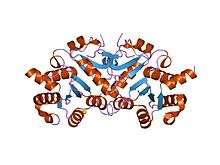3,4-dihydroxy-2-butanone-4-phosphate synthase
In molecular biology, 3,4-dihydroxy-2-butanone 4-phosphate synthase (DHBP synthase) (RibB) EC 4.1.99.12 is an enzyme which catalyses the conversion of D-ribulose 5-phosphate to formate and 3,4-dihydroxy-2-butanone 4-phosphate, the latter serving as the biosynthetic precursor for the xylene ring of riboflavin.[1] In Photobacterium leiognathi, the riboflavin synthesis genes ribB (DHBP synthase), ribE (riboflavin synthase), ribH (lumazine synthase) and ribA (GTP cyclohydrolase II) all reside in the lux operon.[2] RibB is sometimes found as a bifunctional enzyme with GTP cyclohydrolase II that catalyses the first committed step in the biosynthesis of riboflavin. No sequences with significant homology to DHBP synthase are found in the metazoa.
| DHBP_synthase | |||||||||
|---|---|---|---|---|---|---|---|---|---|
 crystal structure of 3,4-dihydroxy-2-butanone 4-phosphate synthase gold derivative | |||||||||
| Identifiers | |||||||||
| Symbol | DHBP_synthase | ||||||||
| Pfam | PF00926 | ||||||||
| InterPro | IPR000422 | ||||||||
| SCOPe | 1iez / SUPFAM | ||||||||
| |||||||||
References
- Richter G, Krieger C, Volk R, Kis K, Ritz H, Götze E, Bacher A (1997). "Biosynthesis of riboflavin: 3,4-dihydroxy-2-butanone-4-phosphate synthase". Methods in Enzymology. 280: 374–82. doi:10.1016/S0076-6879(97)80128-0. PMID 9211332.
- Lin JW, Chao YF, Weng SF (June 2001). "Riboflavin synthesis genes ribE, ribB, ribH, ribA reside in the lux operon of Photobacterium leiognathi". Biochemical and Biophysical Research Communications. 284 (3): 587–95. doi:10.1006/bbrc.2001.5013. PMID 11396941.
This article is issued from Wikipedia. The text is licensed under Creative Commons - Attribution - Sharealike. Additional terms may apply for the media files.